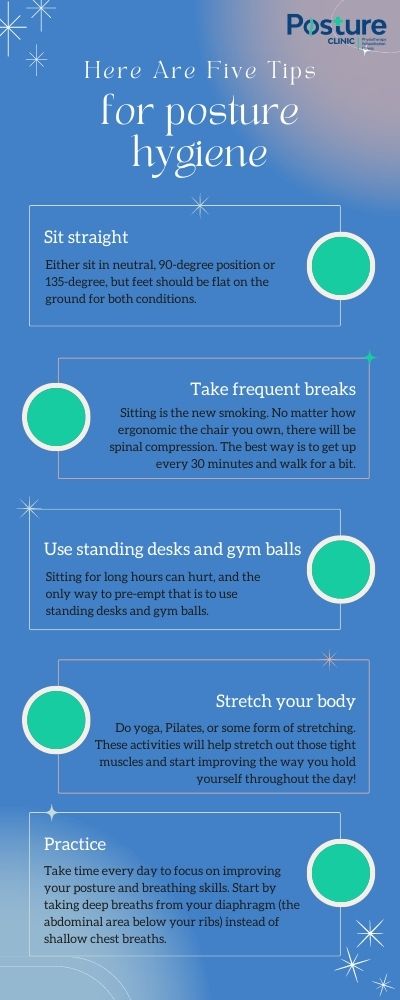Good posture is crucial to a healthy life. But did you know that your posture affects more than just how you look? It also plays an important role in how well your body functions. And while slouching over at your desk may seem harmless, it can actually lead to serious health problems like impaired cognitive function, decreased energy levels and even chronic pain. So sit up straight, and make sure these five shocking facts about good posture don't come as too much of a surprise. Poor posture can cause a number of issues, including arthritis exacerbation, breathing efficacy problems, circulation problems, fatigue, headache, jaw pain, mood change (depression), sexual dysfunction, shoulder and back pain. If static posture, core muscle, and shoulder blade stretches are performed properly every day, it will strengthen the flexibility of the back in a short time.
Exacerbation of arthritis
If you find yourself hunched over all day in front of your computer or driving your car while texting on your phone, you're putting a lot of strain on your spine. This can lead to inflammation in the joints and muscles that support the bones in your neck and lower back—which are already being used to support the weight of your head!
Breathing efficacy problems
When you're slumped over or rounded forward when sitting or standing up straight with good posture helps to open up the rib cage which allows for deeper breathing and more oxygen intake into the lungs. This will give you more energy throughout the day as well as help keep those brain cells firing at optimal levels! For years, doctors have been connecting poor posture with breathing problems and lung disease. But in recent decades, they've also discovered that poor posture can cause an irregular breathing pattern that makes you more susceptible to illness or injury. Poor posture puts stress on your muscles and joints and can affect the flow of oxygen to the brain. This can lead to memory problems, muscle cramps and more serious issues like depression or anxiety.
Circulation problems
These can also be caused by having poor posture for long periods of time each day at work or school whether it's sitting down typing emails/texts/emails on a smartphone all day long sitting in class listening intently and taking notes.
Fatigue
Your body doesn't have room for all the blood flow if you're constantly tilting forward in order to see things clearly. This causes fatigue because there isn't enough oxygen reaching the brain and all the other organs.
Forward head posture
When your head is forward, it puts more pressure on your spine. This can cause back and shoulder pain as well as headaches and migraines. It also affects your breathing because it causes tension in the muscles around your neck and shoulders which makes them harder to move air through effectively. Forward head posture can even make it difficult to speak properly because it changes the shape of your jawbone which changes the way sound comes out when you're speaking!
Headaches and jaw pain
It all starts with your head. When you're hunched over and your shoulders are rounded in an attempt to hold up the weight of your head, you're putting unnecessary pressure on your neck. This can lead to tension headaches and jaw pain.
Sexual dysfunction
On top of that, poor posture affects your mood and ability to feel pleasure—because it makes you look like you have no energy or enthusiasm for life! Shoulder and back pain And finally, it can cause shoulder and back pain because your spine is not aligned properly when you're hunched over. Poor posture isn't just about how you look—it's about how healthy you feel! If you want to live better every day, be sure that you're standing up straight with good posture at all times!
Memory and cognitive function
Your slouchy posture can affect your memory and cognitive function. According to experts, poor circulation may be one of the reasons that slouching affects your memory and cognitive function. Another study found that other factors like back pain and neck pain could also cause issues with blood vessels in the brain, which can lead to reduced oxygen supply. This ultimately leads to slower thinking processes and impaired memory. Physical therapy is the only way to correct posture.
Another study found that people who have a flat or hunched back tend to experience greater levels of stress than those who have an upright posture, which leads them to have higher cortisol levels after stressful encounters. Cortisol is a hormone released when you're under stress; high levels of it can impair focus by increasing anxiety levels and making it difficult for you to concentrate on anything else but what's stressing you out at that moment (like how bad your posture is).
Look and feel
Your posture has a profound effect on how you look and feel. It affects the way your body is perceived by others, as well as how you perceive yourself. Good posture can make you feel better about yourself and increase confidence, productivity, and even digestion. Bad posture will have the opposite effect: it can make you appear older than your actual age; it can lead to back pain or other health issues; it can cause headaches; it makes us less productive at work; and it makes us feel bad about ourselves, like we aren't good enough because we don't measure up in some way. Proper posture by a physical therapist not only fixes muscle tension, but also helps in gaining a dynamic posture. This approach not only will improve your posture but also keep your shoulder, hips and knee in good shape. With the right ergonomics, you will not have rounded shoulders or low back pain. Your abdominal muscles, and shoulder blades will not experience muscle fatigue. Frequent breaks and standing up are just as important to strengthen your core muscles and fix your posture problem.
Cardiovascular, respiratory and nervous systems
Good posture is important for the cardiovascular and nervous systems to carry out their normal functions. The cardiovascular system relies on good posture to provide the optimal conditions for blood flow and oxygenation. When you slouch, you not only restrict blood flow but also reduce your lung capacity. The respiratory system depends on a healthy spine for proper function. The body naturally takes shallow breaths when you slouch which can lead to poor air quality in the lungs due to carbon dioxide buildup and decreased oxygenation of tissues throughout the body which can cause headaches, fatigue, stress or anxiety. The nervous system relies on good posture to transmit signals through neurons (brain cells) without interference from surrounding muscles or joints that may be pulling in different directions during movement (called muscle tone). When there’s any disruption in nerve transmission such as tightness in muscles or joint misalignment then it can affect how well these messages are received by other parts of your body causing physical symptoms such as back pain or headaches.
Sitting is the new smoking
Even sitting in front of a computer all day can damage your posture over time. A standing posture is the best exercise to fix your spinal alignment. Don't go after braces, your real posture corrector is your physio who will fix your forward head posture and muscle imbalances. Proper alignment through sports medicine will not only result in perfect posture but also usher in healthy living. Besides, you can say 'goodbye' to pain and spine issues of any kind, such as lower back pain. A better posture can even prevent heart attack.
The right stretch will help you gain the ideal posture and help your stomach muscles to support your spine. If you sit at a desk all day, you are probably familiar with the aches and pains that come along with it. And if your job requires you to stare at a computer screen for hours on end, chances are good that your posture has suffered.
According to the American Chiropractic Association (ACA), poor posture can lead to chronic pain and muscle strain throughout the body-particularly in the neck, shoulders and back. The ACA also reports that more than 80 percent of Americans suffer from some type of back pain during their lifetime (and one-third will have lower back problems). One study even points out that sitting at a 135-degree reclined angle with feet flat on the ground is better for the spine than a 90-degree tilt.
What can you do to improve posture and breathing?

You may be surprised to find that your posture can improve with simple changes. Gain a good posture by following these seven tips...
- Take a break
This is a great way to improve posture, because it allows you to stop and think about how you're standing or sitting. You might not realise that you're slouching until you take a moment to sit up straight and take stock of yourself.
- Change phone
If your phone is causing problems with your posture, try switching to an old-fashioned landline for the day or even permanently! You'll see an immediate improvement in your body's alignment when you're not hunched over trying to read tiny text on a screen.
- Dump the phone and have a technology holiday
If that's not possible, give yourself time off from technology (including laptops) every day or two so that you can focus on improving your posture and breathing techniques. You might be surprised at how quickly this improves things!
- Do yoga, Pilates, or some form of stretching
These activities will help stretch out those tight muscles and start improving the way you hold yourself throughout the day! Again, it takes practice to get it right—so don't expect miracles overnight!
- Standing desks
They are the best way to improve your posture at work. You can also try using a standing desk at home, but if you don't have one, try to find a place in the house where you can stand up when doing chores or cooking.
- Find the neutral position of your spine and limbs
This means keeping them in alignment with each other. For example, when standing up straight, make sure your shoulders are back and down, and not rounded forward or pulled back too far like a turtle shell.
- Practice
Take time every day to focus on improving your posture and breathing skills. Start by taking deep breaths from your diaphragm (the abdominal area below your ribs) instead of shallow chest breaths that take more energy than they give back in terms of oxygen exchange through the bloodstream for fuel for muscles during exercise or other activities such as walking around school campus between classes instead of sitting on bus all day long!
Conclusion
You probably think of your posture as something you’ve always had, or something that’s out of your hands. But good posture is a habit that can be made-and broken! You might not be able to control whether or not you slouch, but you can work on improving your posture in small ways every day. It may feel uncomfortable at first, but these tips will help make it easier for you to correct even the most ingrained bad habits. If you need to fix your posture under expert guidance, call the Posture Clinic for timely intervention. Our posture experts will correct your gait and help you lead a pain-free life. Call +91-77601-37578.

